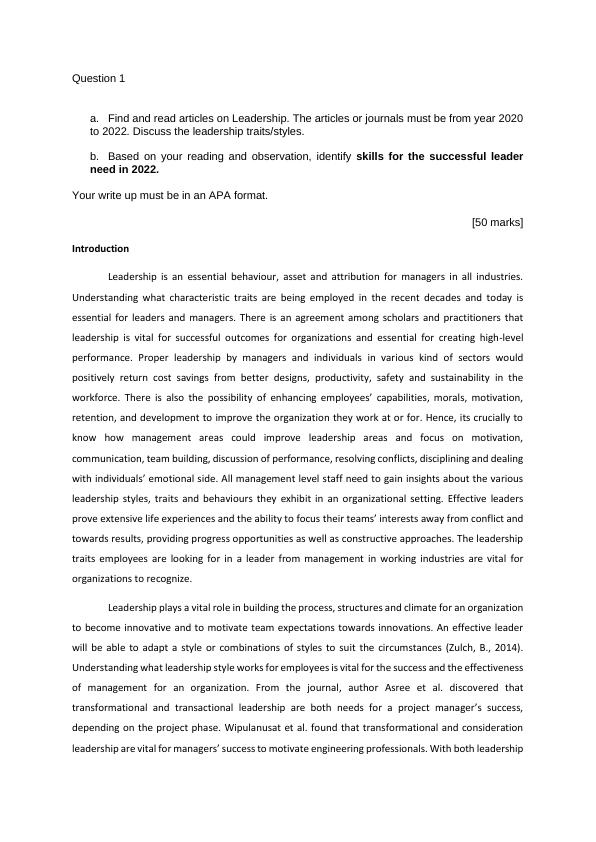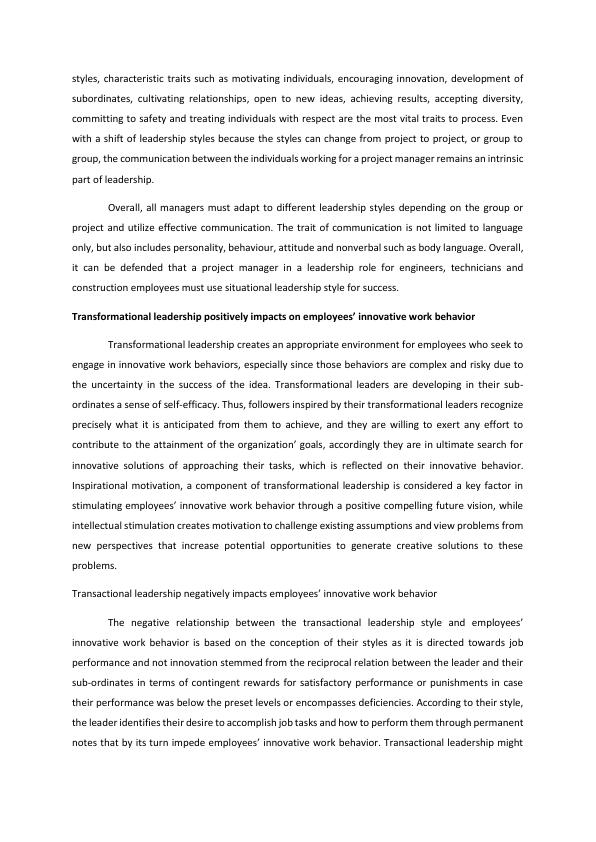Leadership Traits Article 2022
Added on 2022-11-21
5 Pages1931 Words29 Views
Question 1
a. Find and read articles on Leadership. The articles or journals must be from year 2020
to 2022. Discuss the leadership traits/styles.
b. Based on your reading and observation, identify skills for the successful leader
need in 2022.
Your write up must be in an APA format.
[50 marks]
Introduction
Leadership is an essential behaviour, asset and attribution for managers in all industries.
Understanding what characteristic traits are being employed in the recent decades and today is
essential for leaders and managers. There is an agreement among scholars and practitioners that
leadership is vital for successful outcomes for organizations and essential for creating high-level
performance. Proper leadership by managers and individuals in various kind of sectors would
positively return cost savings from better designs, productivity, safety and sustainability in the
workforce. There is also the possibility of enhancing employees’ capabilities, morals, motivation,
retention, and development to improve the organization they work at or for. Hence, its crucially to
know how management areas could improve leadership areas and focus on motivation,
communication, team building, discussion of performance, resolving conflicts, disciplining and dealing
with individuals’ emotional side. All management level staff need to gain insights about the various
leadership styles, traits and behaviours they exhibit in an organizational setting. Effective leaders
prove extensive life experiences and the ability to focus their teams’ interests away from conflict and
towards results, providing progress opportunities as well as constructive approaches. The leadership
traits employees are looking for in a leader from management in working industries are vital for
organizations to recognize.
Leadership plays a vital role in building the process, structures and climate for an organization
to become innovative and to motivate team expectations towards innovations. An effective leader
will be able to adapt a style or combinations of styles to suit the circumstances (Zulch, B., 2014).
Understanding what leadership style works for employees is vital for the success and the effectiveness
of management for an organization. From the journal, author Asree et al. discovered that
transformational and transactional leadership are both needs for a project manager’s success,
depending on the project phase. Wipulanusat et al. found that transformational and consideration
leadership are vital for managers’ success to motivate engineering professionals. With both leadership
a. Find and read articles on Leadership. The articles or journals must be from year 2020
to 2022. Discuss the leadership traits/styles.
b. Based on your reading and observation, identify skills for the successful leader
need in 2022.
Your write up must be in an APA format.
[50 marks]
Introduction
Leadership is an essential behaviour, asset and attribution for managers in all industries.
Understanding what characteristic traits are being employed in the recent decades and today is
essential for leaders and managers. There is an agreement among scholars and practitioners that
leadership is vital for successful outcomes for organizations and essential for creating high-level
performance. Proper leadership by managers and individuals in various kind of sectors would
positively return cost savings from better designs, productivity, safety and sustainability in the
workforce. There is also the possibility of enhancing employees’ capabilities, morals, motivation,
retention, and development to improve the organization they work at or for. Hence, its crucially to
know how management areas could improve leadership areas and focus on motivation,
communication, team building, discussion of performance, resolving conflicts, disciplining and dealing
with individuals’ emotional side. All management level staff need to gain insights about the various
leadership styles, traits and behaviours they exhibit in an organizational setting. Effective leaders
prove extensive life experiences and the ability to focus their teams’ interests away from conflict and
towards results, providing progress opportunities as well as constructive approaches. The leadership
traits employees are looking for in a leader from management in working industries are vital for
organizations to recognize.
Leadership plays a vital role in building the process, structures and climate for an organization
to become innovative and to motivate team expectations towards innovations. An effective leader
will be able to adapt a style or combinations of styles to suit the circumstances (Zulch, B., 2014).
Understanding what leadership style works for employees is vital for the success and the effectiveness
of management for an organization. From the journal, author Asree et al. discovered that
transformational and transactional leadership are both needs for a project manager’s success,
depending on the project phase. Wipulanusat et al. found that transformational and consideration
leadership are vital for managers’ success to motivate engineering professionals. With both leadership

styles, characteristic traits such as motivating individuals, encouraging innovation, development of
subordinates, cultivating relationships, open to new ideas, achieving results, accepting diversity,
committing to safety and treating individuals with respect are the most vital traits to process. Even
with a shift of leadership styles because the styles can change from project to project, or group to
group, the communication between the individuals working for a project manager remains an intrinsic
part of leadership.
Overall, all managers must adapt to different leadership styles depending on the group or
project and utilize effective communication. The trait of communication is not limited to language
only, but also includes personality, behaviour, attitude and nonverbal such as body language. Overall,
it can be defended that a project manager in a leadership role for engineers, technicians and
construction employees must use situational leadership style for success.
Transformational leadership positively impacts on employees’ innovative work behavior
Transformational leadership creates an appropriate environment for employees who seek to
engage in innovative work behaviors, especially since those behaviors are complex and risky due to
the uncertainty in the success of the idea. Transformational leaders are developing in their sub-
ordinates a sense of self-efficacy. Thus, followers inspired by their transformational leaders recognize
precisely what it is anticipated from them to achieve, and they are willing to exert any effort to
contribute to the attainment of the organization’ goals, accordingly they are in ultimate search for
innovative solutions of approaching their tasks, which is reflected on their innovative behavior.
Inspirational motivation, a component of transformational leadership is considered a key factor in
stimulating employees’ innovative work behavior through a positive compelling future vision, while
intellectual stimulation creates motivation to challenge existing assumptions and view problems from
new perspectives that increase potential opportunities to generate creative solutions to these
problems.
Transactional leadership negatively impacts employees’ innovative work behavior
The negative relationship between the transactional leadership style and employees’
innovative work behavior is based on the conception of their styles as it is directed towards job
performance and not innovation stemmed from the reciprocal relation between the leader and their
sub-ordinates in terms of contingent rewards for satisfactory performance or punishments in case
their performance was below the preset levels or encompasses deficiencies. According to their style,
the leader identifies their desire to accomplish job tasks and how to perform them through permanent
notes that by its turn impede employees’ innovative work behavior. Transactional leadership might
subordinates, cultivating relationships, open to new ideas, achieving results, accepting diversity,
committing to safety and treating individuals with respect are the most vital traits to process. Even
with a shift of leadership styles because the styles can change from project to project, or group to
group, the communication between the individuals working for a project manager remains an intrinsic
part of leadership.
Overall, all managers must adapt to different leadership styles depending on the group or
project and utilize effective communication. The trait of communication is not limited to language
only, but also includes personality, behaviour, attitude and nonverbal such as body language. Overall,
it can be defended that a project manager in a leadership role for engineers, technicians and
construction employees must use situational leadership style for success.
Transformational leadership positively impacts on employees’ innovative work behavior
Transformational leadership creates an appropriate environment for employees who seek to
engage in innovative work behaviors, especially since those behaviors are complex and risky due to
the uncertainty in the success of the idea. Transformational leaders are developing in their sub-
ordinates a sense of self-efficacy. Thus, followers inspired by their transformational leaders recognize
precisely what it is anticipated from them to achieve, and they are willing to exert any effort to
contribute to the attainment of the organization’ goals, accordingly they are in ultimate search for
innovative solutions of approaching their tasks, which is reflected on their innovative behavior.
Inspirational motivation, a component of transformational leadership is considered a key factor in
stimulating employees’ innovative work behavior through a positive compelling future vision, while
intellectual stimulation creates motivation to challenge existing assumptions and view problems from
new perspectives that increase potential opportunities to generate creative solutions to these
problems.
Transactional leadership negatively impacts employees’ innovative work behavior
The negative relationship between the transactional leadership style and employees’
innovative work behavior is based on the conception of their styles as it is directed towards job
performance and not innovation stemmed from the reciprocal relation between the leader and their
sub-ordinates in terms of contingent rewards for satisfactory performance or punishments in case
their performance was below the preset levels or encompasses deficiencies. According to their style,
the leader identifies their desire to accomplish job tasks and how to perform them through permanent
notes that by its turn impede employees’ innovative work behavior. Transactional leadership might

End of preview
Want to access all the pages? Upload your documents or become a member.
Related Documents
Assignment on Leadership Style Explainslg...
|3
|578
|20
Leadership Skills - Assignmentlg...
|18
|3805
|48
Leadership Styles and Theories Adopted by Jeff Bezoslg...
|9
|542
|312
Leadership Skills in Cool Runnings Movie: Critical Evaluation of Derice Bannock's Role in Team's Achievementlg...
|13
|4344
|77
18BSP321 - Contemporary Perspectives On Leadershiplg...
|19
|4444
|73
Contemporary Perspectives on Leadership: Styles, Ethics, and Cross-Cultural Competencieslg...
|18
|4610
|484
